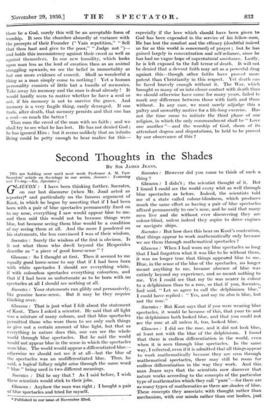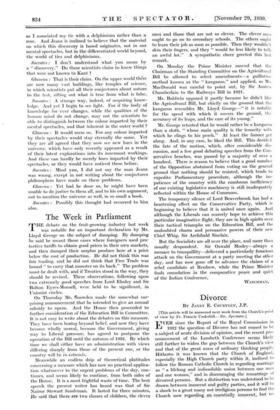Second Thoughts in the Shades
BY SIR JAMES JEANS.
We are holding over until next week Professor A. M. Carr Saunders' article on Sociology in our series, Science : Yesterday and To-day.—En. Spectator.] fltLAUCON : I have been thinking further, Socrates, kJ- on our last discourse (when Mr. Joad acted as reporter)* and particularly on the famous argument of Kant, in which he began by asserting that if I had been born with a pair of blue spectacles permanently fixed on to my nose, everything I saw would appear blue to me, and then said this would not be because things were blue, but because seeing them blue would be a condition of my seeing them at all. And the more I pondered on his statements, the less convinced I was of their wisdom.
Socrates : Surely the wisdom of the first is obvious. Is it not what those who dwell beyond the Hesperides describe as "a piece of good horse-sense " ?
Olaucon : So I thought at first. Then it seemed to me equally good horse-sense to say that if I had been born with white spectacles I should see everything white, if with colourless spectacles everything colourless, and that if I had been so unfortunate as to be born with no spectacles at all I should see nothing at all.
Socrates : Your statements run glibly and persuasively, like genuine horse-sense. But it may be they require thinking over.
Glaucon That is just what I felt about the statement of Kant.. Then I asked a scientist. He said that all light was a mixture of many colours, and that blue spectacles permitted those who wore them to see only such things as give out a certain amount of blue light, but that as everything in nature does this, one can see the whole world through blue spectacles. But he said the world would not appear blue in the sense in which the spectacles were blue. The world would appear a differentiated blue— otherwise we should not see it at all—but the blue of the spectacles was an undifferentiated blue. Thus, he said, a logical fallacy might arise through the same word " blue " being used in two different meanings.
Socrates : Did he say that ? As I said before, I wish these scientists would stick to their jobs.
Glaucon : Anyhow the man was right ; I bought a pair of blue spectacles and tried for myself.
• Published in our isaine of November
Socrates : however did you come to think of such a thing ?
Glaucon : I didn't ; the scientist thought of it. But I found I could see the world every whit as well through blue spectacles as before. Indeed, the scientists told me of a state called colour-blindness, which produces much the same effect as having a pair of blue spectacles affixed permanently to one's nose, and he said that ninny men live and die without ever discovering they are colour-blind, unless indeed they aspire to drive engines or navigate ships.
Socrates : But how does this bear on Kant's contention, that things appear to work mathematically only because we see them through mathematical spectacles ?
Glaucon : When I had worn my blue spectacles so long that I had forgotten what it was like to be without them, it was no longer true that things appeared blue to me. Blue, in the sense of the blue of the spectacles, no longer meant anything to me, because absence of blue was entirely beyond my experience, and so meant nothing to me. Yet I could see that my tie was nearer in colour to a delphinium than to a rose, so that if you, Socrates, had said, "Let us agree to call the delphinium blue," I could have replied : "Yes, and my tie also is blue, but not the rose."
Socrates : But Kant says that if you were wearing blue spectacles, it would be because of this, that your tie and the delphinium both looked blue, and that you could not see the rose at all unless it, too, looked blue.
Glaucon : I did see the rose, and it did not look blue, at least not with the blue of the delphinium. I found that there is endless differentiation in the world, even when it is seen through blue spectacles. In the same way, I reflected, even if it is admitted that all things appear to work mathematically because they are seen through mathematical spectacles, there may still be room for endless differentiation in the way they work. And this man Jeans says that the scientists now discover that nature works according to the concepts of the particular type of mathematics which they call "pure"—for there are as many types of mathematics as there are shades of blue. These concepts they associate, with thought rather than mechanism, with our minds rather than our bodies, just
as I associated my tie with a delphinium rather than a rose. And Jeans is inclined to believe that the material on which this discovery is based originates, not in our mental spectacles, but in the differentiated world beyond, the world of ties and delphiniums.
Socrates : I don't understand what you mean by a "discovery." Do these scientists claim to know things that were not known to Kant ?
Glaucon : That is their claim. On the upper world there are now many vast buildings, like temples of science, in which scientists put all their conjectures about nature to the test, sifting out what is true from what is false.
Socrates : A strange way, indeed, of acquiring know- ledge. And yet I begin to see light. For if the body of knowledge for ever changes, while the qualities of the human mind do not change, may not the scientists be able to distinguish between the colour imparted by their mental spectacles, and that inherent in the outer world ?
Glaucon : It would seem so. For any colour imparted by their spectacles would stay eternally the same. Yet they are all agreed that they now see new hues in the universe, which have only recently appeared as a result of their latest explorations into its innermost workings. And these can hardly be merely hues imparted by their spectacles, or they would have noticed them before.
Socrates : Mind you, I did not say the man -Jeans was wrong, except in not writing about the conjectures philosophers have made on these problems.
Glaucon : Yet had he done so, 'he might have been unable to do justice to them all, and to his own argument, not to mention the universe as well, in so small a book.
Socrates : Possibly this thought had occurred to him also.











































 Previous page
Previous page